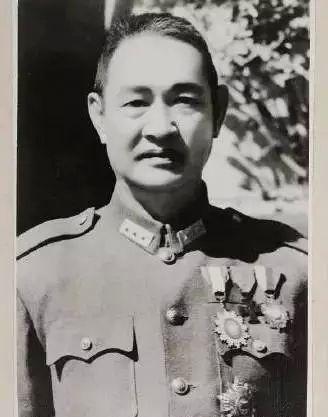
Text/Kingdom Building
He was a late Qing Dynasty xiucai and an elder of the League. Whether it is Yuan Shikai in Beiyang or Sun Yat-sen, the leader of the revolution, he is very important to him. Because of the solid implementation of Sun Yat-sen's "three major policies", he was once suspended by the Kuomintang authorities from the functions of the Central Executive Committee and was monitored by secret agents. During the War of Resistance Against Japanese Aggression, he served as the commander of the First Theater and commanded major battles such as the Battle of Lanfeng. In 1949, he rebelled with General Chen Mingren in Hunan and made great contributions to the cause of liberation. He was Cheng Qian, a famous patriotic general of the Kuomintang.
Cheng Qian, born on March 31, 1882, is a native of Lianchong Village, Beixiang Township, Liling County, Hunan. The Cheng family has been cultivating for generations and has a good educational environment. Therefore, Cheng Qian received a private school education from a young age, and at the age of 16, he passed the child exam and became a talent.
In 1900, he entered the Yuelu Academy in Changsha to study. Originally, I wanted to pass the imperial examination to gain fame. However, after coming into contact with modern cultural knowledge, he changed Cheng Qian's ideals in life, still gave up the road of the imperial examination, and was admitted to the Hunan Wubei Academy with the first place.
In 1904, Cheng Qian was sent to Japan to study. During his study abroad, he met Huang Xing, Song Jiaoren, Li Liejun and others, and often discussed Chinese current politics together. The following year, the League was founded, and Cheng Qian became one of the first members and interviewed the revolutionary leader Sun Yat-sen.
When the Xinhai Revolution broke out in 1911, Cheng Qian, who was a staff officer in the 17th town (equivalent to a division) of the Qing Army, gave up his military post and went to Wuchang to assist Huang Xing in commanding the rebel army to attack the city. After the success of the uprising, he served as the head of the Hunan Military Department.
In 1915, the Beiyang warlord Yuan Shikai rebelled against the revolution and ascended the throne as emperor. Cai Yi and other revolutionaries organized the Nationalist army to fight against Yuan Shikai. Cheng Li responded with a hunan army, and was appointed by Cai Yi as an envoy to Hunan, leading his troops to fight against the Beiyang Army. After the victory of the Patriotic Movement, Cheng Qian took charge of Hunan.
In 1920, Sun Yat-sen established a military government in Guangzhou and transferred Cheng Qian to the post of deputy head of the War Department. During the Second Northern Expedition, he served as the commander of the 6th Army and led his troops to attack Nanchang, Jiangxi, making great achievements for the victory of the Northern Expedition. Therefore, after the end of the Northern Expedition, he was elected as a member of the Executive Committee of the Kuomintang Central Committee and entered the ranks of state leaders.
On June 23, 1927, cheng qian was suspended from his post for adhering to Sun Yat-sen's three major policies of "uniting with Russia, uniting with the Communist Party, and assisting workers and peasants", and was subjected to surveillance by secret agents and restrictions on personal freedom for a year and a half. After the restoration of freedom, it was the Time of the Central Plains War, and several major Chinese warlords fought together. Cheng Qian worked tirelessly and ran among the warlords to make peace for everyone. Although the mediation was ineffective, it won the hearts and minds of the people.
In 1936, Cheng Qian was promoted to the second rank of general in the army, served as the chief of staff of the Military Commission, and was awarded the Baoding Medal of the First Class. On December 12 of the same year, the Xi'an Incident broke out, and Chiang Kai-shek was detained by Zhang Xueliang, Yang Hucheng and other patriotic generals. As a standing committee member of the Military Commission, Cheng Qian prevented He Yingqin and others from being rescued by force, and played an active role in the peaceful settlement of the Xi'an Incident.
After the outbreak of the War of Resistance Against Japan, Cheng Qian participated in the formulation of operational plans such as the Battle of Songhu and the Battle of Nanjing. In 1938, he was transferred to the commander of the First Theater and the chairman of Henan Province, leading a group of central troops to engage the Japanese army in Henan, and commanding the Battle of Lanfeng and other battles. However, the highly respected Cheng Qian commanded these arrogant generals, and the Battle of Lanfeng was lost in a mess, and finally had to blow up the mouth of the Yellow River Garden to block the Japanese attack. Later, he was transferred to the Deputy General Staff of the Military Commission and sat on the cold bench.
In 1948, Cheng Qian ran for vice president. Because he was not accustomed to Sun Ke's style, he gave up his campaign and voted for another vice presidential candidate, Li Zongren. As a result, Li Zongren defeated Sun Ke and became the vice president of Chiang Kai-shek, so angry that Chiang Kai-shek slapped the table and scolded.
In May 1949, Cheng Qian, who witnessed the corruption and incompetence of the Kuomintang authorities, joined forces with General Chen Mingren to declare a peaceful uprising and make great contributions to the cause of liberation. He was considered to be the early time keeper of the uprising among the senior generals of the Nationalist Army, and the ending was very good. On April 9, 1968, Cheng Died in Beijing at the age of 87.